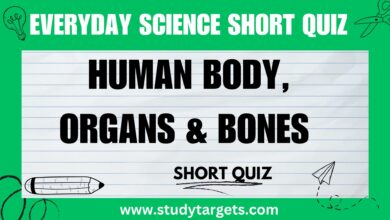MCQs: Human Blood, Blood Vessels & Blood Groups :Everyday Science MCQs

Human Bloods and Blood Group:
1.What is the main function of red blood cells in the human body?
a) Fight infections
b) Transport oxygen
c) Produce antibodies
d) Clot blood
Answer: b) Transport oxygen
2. Which of the following components of blood is responsible for clotting?
a) Red blood cells
b) White blood cells
c) Platelets
d) Plasma
Answer: c) Platelets
3. Which blood cell type is involved in the body’s immune response to fight infections?
a) Red blood cells
b) White blood cells
c) Platelets
d) Plasma
Answer: b) White blood cells
4. What is the liquid component of blood in which cells are suspended?
a) Red blood cells
b) White blood cells
c) Platelets
d) Plasma
Answer: d) Plasma
5. Which blood type is considered the universal donor because it can be transfused to individuals with other blood types?
a) A
b) B
c) AB
d) O
Answer: d) O
6. If a person has the ABO blood group of AB, which antigens are present on their red blood cells?
a) A and B
b) A
c) B
d) Neither A nor B
Answer: a) A and B
7. Which blood type contains both anti-A and anti-B antibodies in their plasma?
a) A
b) B
c) AB
d) O
Answer: d) O
8. If both parents have O blood type, what blood type(s) can their biological children have?
a) Only O
b) A, B, or AB
c) A, B, AB, or O
d) Only A or B
Answer: a) Only O
9. Rh factor is an important component of blood groups. What is another name for the Rh factor?
a) Rhesus factor
b) Rhodium factor
c) Riboflavin factor
d) Rosuvastatin factor
Answer: a) Rhesus factor
10. If a person with blood type A receives blood from a person with blood type B, what is the potential risk?
a) No risk, blood types are compatible
b) Risk of blood clotting
c) Risk of an allergic reaction
d) Risk of blood infection
Answer: c) Risk of an allergic reaction
11. Which blood type(s) can an individual with blood type AB receive in a blood transfusion?
a) Only AB
b) Only O
c) A, B, or AB
d) Only B
Answer: c) A, B, or AB
12. What is the most common blood type among humans worldwide?
a) A
b) B
c) AB
d) O
Answer: d) O
13. If a person has the ABO blood group of B, which antibodies are present in their plasma?
a) Anti-A
b) Anti-B
c) Anti-AB
d) Neither anti-A nor anti-B
Answer: a) Anti-A
14. Which blood type(s) can an individual with blood type O receive in a blood transfusion?
a) Only O
b) Only A or B
c) A, B, AB, or O
d) Only AB
Answer: a) Only O
15. If a person with blood type O receives blood from a person with blood type AB, what is the potential risk?
a) No risk, blood types are compatible
b) Risk of blood clotting
c) Risk of an allergic reaction
d) Risk of blood infection
Answer: a) No risk, blood types are compatible
16. What is the rarest blood type among humans worldwide?
a) A
b) B
c) AB
d) O
Answer: c) AB
17. Which blood type(s) can an individual with blood type B receive in a blood transfusion?
a) Only O
b) Only B
c) A, B, or O
d) Only AB
Answer: c) A, B, or O
18. If a person has the ABO blood group of O, which antigens are present on their red blood cells?
a) A and B
b) A
c) B
d) Neither A nor B
Answer: d) Neither A nor B
19. Which blood type(s) can an individual with blood type A receive in a blood transfusion?
a) Only B
b) Only A
c) A, B, or O
d) Only AB
Answer: c) A, B, or O
20. Which blood type(s) can an individual with blood type AB receive in a blood transfusion?
a) Only AB
b) Only A or B
c) A, B, AB, or O
d) Only O
Answer: c) A, B, AB, or O
21. What is the term used to describe a person with O negative (O-) blood type?
a) Universal donor
b) Universal recipient
c) Rh positive
d) Rh negative
Answer: a) Universal donor
22. If a person has the ABO blood group of A, which antibodies are present in their plasma?
a) Anti-A
b) Anti-B
c) Anti-AB
d) Neither anti-A nor anti-B
Answer: b) Anti-B
23. What is the term used to describe a person with AB positive (AB+) blood type?
a) Universal donor
b) Universal recipient
c) Rh positive
d) Rh negative
Answer: b) Universal recipient
24. If a person has Rh-negative (Rh-) blood type, which Rh factor(s) can they receive in a blood transfusion?
a) Only Rh-positive (Rh+)
b) Only Rh-negative (Rh-)
c) Both Rh-positive (Rh+) and Rh-negative (Rh-)
d) Neither Rh-positive (Rh+) nor Rh-negative (Rh-)
Answer: c) Both Rh-positive (Rh+) and Rh-negative (Rh-)
25. Which blood type(s) can an individual with blood type AB receive in a blood transfusion?
a) Only AB
b) Only A or B
c) A, B, or O
d) Only O
Answer: a) Only AB
26. What is the term used to describe a person with B negative (B-) blood type?
a) Universal donor
b) Universal recipient
c) Rh positive
d) Rh negative
Answer: c) Rh positive
27.Which blood type(s) can an individual with blood type O receive in a blood transfusion?
a) Only O
b) Only A or B
c) A, B, AB, or O
d) Only AB
Answer: a) Only O
28. What is the term used to describe a person with A positive (A+) blood type?
a) Universal donor
b) Universal recipient
c) Rh positive
d) Rh negative
Answer: c) Rh positive
29. If a person has Rh-negative (Rh-) blood type, which Rh factor(s) can they receive in a blood transfusion?
a) Only Rh-positive (Rh+)
b) Only Rh-negative (Rh-)
c) Both Rh-positive (Rh+) and Rh-negative (Rh-)
d) Neither Rh-positive (Rh+) nor Rh-negative (Rh-)
Answer: b) Only Rh-negative (Rh-)
30. What is the term used to describe a person with B positive (B+) blood type?
a) Universal donor
b) Universal recipient
c) Rh positive
d) Rh negative
Answer: c) Rh positive
31. If a person has Rh-positive (Rh+) blood type, which Rh factor(s) can they donate in a blood transfusion?
a) Only Rh-positive (Rh+)
b) Only Rh-negative (Rh-)
c) Both Rh-positive (Rh+) and Rh-negative (Rh-)
d) Neither Rh-positive (Rh+) nor Rh-negative (Rh-)
Answer: c) Both Rh-positive (Rh+) and Rh-negative (Rh-)
32. If a person has Rh-positive (Rh+) blood type, which Rh factor(s) can they donate in a blood transfusion?
a) Only Rh-positive (Rh+)
b) Only Rh-negative (Rh-)
c) Both Rh-positive (Rh+) and Rh-negative (Rh-)
d) Neither Rh-positive (Rh+) nor Rh-negative (Rh-)
Answer: a) Only Rh-positive (Rh+)
33. In which blood type(s) are both anti-A and anti-B antibodies present in the plasma?
a) A
b) B
c) AB
d) O
Answer: d) O
34. What is the term used to describe a person with A negative (A-) blood type?
a) Universal donor
b) Universal recipient
c) Rh positive
d) Rh negative
Answer: d) Rh negative
35. If a person has Rh-negative (Rh-) blood type, which Rh factor(s) can they donate in a blood transfusion?
a) Only Rh-positive (Rh+)
b) Only Rh-negative (Rh-)
c) Both Rh-positive (Rh+) and Rh-negative (Rh-)
d) Neither Rh-positive (Rh+) nor Rh-negative (Rh-)
Answer: b) Only Rh-negative (Rh-)
36. Which blood type(s) can an individual with blood type A receive in a blood transfusion?
a) Only B
b) Only A
c) A, B, or O
d) Only AB
Answer: c) A, B, or O
37. What is the term used to describe a person with O positive (O+) blood type?
a) Universal donor
b) Universal recipient
c) Rh positive
d) Rh negative
Answer: c) Rh positive
38. If a person has Rh-positive (Rh+) blood type, which Rh factor(s) can they receive in a blood transfusion?
a) Only Rh-positive (Rh+)
b) Only Rh-negative (Rh-)
c) Both Rh-positive (Rh+) and Rh-negative (Rh-)
d) Neither Rh-positive (Rh+) nor Rh-negative (Rh-)
Answer: a) Only Rh-positive (Rh+)
39. In which blood type(s) are both anti-A and anti-B antibodies absent in the plasma?
a) A
b) B
c) AB
d) O
Answer: c) AB
40. What is the term used to describe a person with AB negative (AB-) blood type?
a) Universal donor
b) Universal recipient
c) Rh positive
d) Rh negative
Answer: b) Universal recipient
41. If a person has Rh-negative (Rh-) blood type, which Rh factor(s) can they donate in a blood transfusion?
a) Only Rh-positive (Rh+)
b) Only Rh-negative (Rh-)
c) Both Rh-positive (Rh+) and Rh-negative (Rh-)
d) Neither Rh-positive (Rh+) nor Rh-negative (Rh-)
Answer: b) Only Rh-negative (Rh-)
42. Which blood type(s) can an individual with blood type AB receive in a blood transfusion?
a) Only AB
b) Only A or B
c) A, B, AB, or O
d) Only O
Answer: c) A, B, AB, or O
43. What is the term used to describe a person with O negative (O-) blood type?
a) Universal donor
b) Universal recipient
c) Rh positive
d) Rh negative
Answer: a) Universal donor
Blood Vessels:
1. Which type of blood vessel carries oxygenated blood away from the heart to various parts of the body?
a) Artery
b) Vein
c) Capillary
d) Aorta
Answer: a) Artery
2. What is the smallest type of blood vessel in the human body?
a) Artery
b) Vein
c) Capillary
d) Vena cava
Answer: c) Capillary
3. Which blood vessels have valves to prevent the backflow of blood?
a) Arteries
b) Veins
c) Capillaries
d) Aorta
Answer: b) Veins
4. What is the largest artery in the human body?
a) Carotid artery
b) Pulmonary artery
c) Coronary artery
d) Aorta
Answer: d) Aorta
5. Which blood vessels carry deoxygenated blood from the body back to the heart?
a) Arteries
b) Veins
c) Capillaries
d) Aorta
Answer: b) Veins
6. Which type of blood vessel is responsible for the exchange of nutrients, oxygen, and waste products between blood and body tissues?
a) Artery
b) Vein
c) Capillary
d) Aorta
Answer: c) Capillary
7. What is the function of the coronary arteries in the human body?
a) Transporting oxygen to the lungs
b) Carrying blood to the brain
c) Supplying oxygen and nutrients to the heart muscle
d) Draining deoxygenated blood from the legs
Answer: c) Supplying oxygen and nutrients to the heart muscle
8. Which blood vessels play a crucial role in regulating blood pressure in the human body?
a) Arteries
b) Veins
c) Capillaries
d) Vena cava
Answer: a) Arteries
9. What is the main function of the pulmonary veins?
a) Carry oxygenated blood from the lungs to the heart
b) Transport deoxygenated blood from the body to the heart
c) Exchange nutrients and waste products with body tissues
d) Supply oxygen to the brain
Answer: a) Carry oxygenated blood from the lungs to the heart
10. Where is the carotid artery located in the human body?
a) Neck
b) Wrist
c) Chest
d) Abdomen
Answer: a) Neck



